Comsat Angels - Interview
by Denzil Watson
published: 5 / 2 / 2016
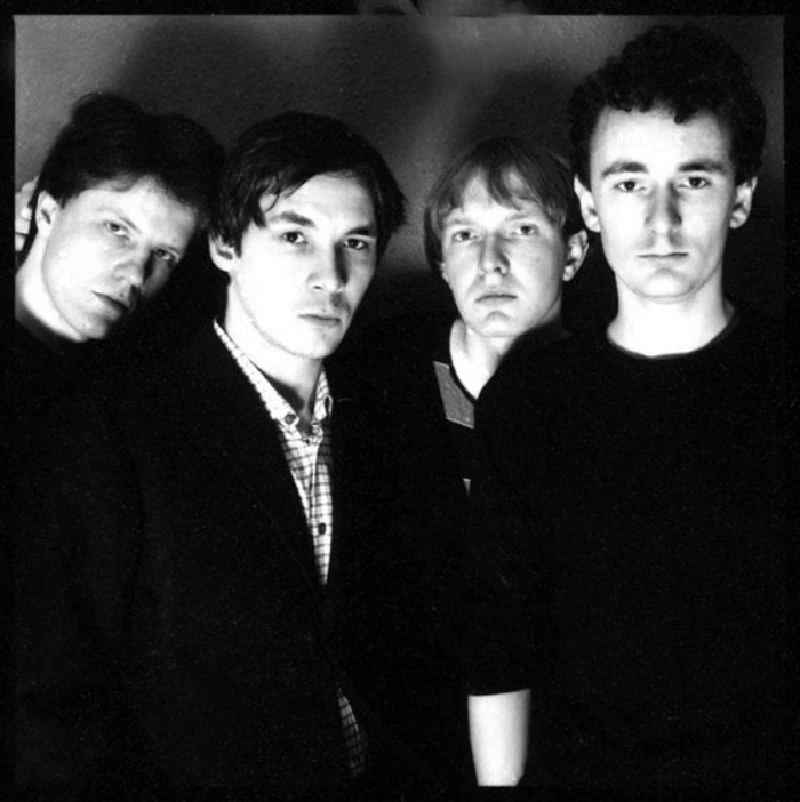
intro
Denzil Watson speaks to Stephen Fellows, the frontman from Sheffield-based 80's post-punk group the Comsat Angels, about the reissue of four of their albums in double CD editions
Sheffield post-punk four piece the Comsat Angels first came to prominence in the 1980s with their debut LP on Polydor 'Waiting for a Miracle' and the single 'Independence Day'. Their atmospheric, gothic tinged gloom rock, reminiscent of Joy Division, the Dance Society and the Church, certainly struck a chord with Joe Public back then. A national tour supporting a fledgling U2 in 1981 hinted at a bright future, and, despite being dropped by Polydor in 1983, two further major labels, Jive and Island, saw potential in the Comsats. Again, both labels failed to bring their brooding sound-scapes to a bigger audience and by 1995, with no less than eight studio albums under their belt, the group finally disbanded. A series of poor commercial decisions, downright bad luck and critically the lack of that big hit and chart success blighted the band as they failed to fulfil their early potential and scale the heights the likes of U2 went on to reach. But like many new wave bands from the 80s, their legacy continued to grow leading to a series of re-issues. The band’s original line-up of Stephen Fellows (vocals/guitar), Kevin Bacon (bass), Mik Glaisher (drums) and Andy Peake (keyboards) briefly reformed in 2009 for a show in their home town and a short UK tour. In November Edsel(an off-shoot of the BBC-owned Demon Music Group) reissued the remastered and expanded CD editions of the band’s Polydor trilogy, 'Waiting for a Miracle' (1980), 'Sleep No More' (1981), 'Fiction' (1982) and also together their 1986 and 1990 albums 'Chasing Shadows/Fire on the Moon', so interest in the band is set to elevate again. Pennyblackmusic caught up with their self-effacing front-man, Stephen Fellows, to see what the future holds for the band. PB: Can you tell me how the re-issues came about? SF: Quite simple really. Edsel, an off-shoot of the BBC, approached us. I’ve kind of prepared things for release a few times before and didn’t want to do it any more so I let them get on with it. I don’t really know what the extra tracks are or anything. I’ve not seen any artwork or photos. PB: Is it a bit weird being divorced from the reissue process? SF: No, it’s a relief! The label wanted photos and tracks that haven’t been used before but, having had them re-issued twice before, there aren’t any!. We haven’t had a photo session in God knows how many years. They think that you’ve got this infinite supply of previously unused things. So I don’t really know what they are like. PB: Are you still proud of the original recordings? SF: I’m never proud of anything. So, no. I’m still not proud. PB: Is that the nature of the beast being a musician, in that you always think things can be better? SF: I expect the price you pay is that you never know whether it’s any good or not. I think people who claim to know are either deluded or lying. It’s quite possible to say how you enjoy other people’s music but you don’t listen to your own stuff. Why would you do that? I find it quite weird. PB: Equally there is a train of thought that goes if you don’t love your own music how can you expect other people to? SF: It’s an interesting idea. It’s not a matter of liking it, as by the time you hear the finished thing you’ve heard it a million times and I think it may be a case of wearing out the neural pathway so you don’t need to hear it any more. I certainly don’t need to listen to it after it’s been recorded. PB: Well, I have listened to them and one thing that strikes me about the albums is that they haven't dated. They still sound very contemporary. SF: Yes. I don’t know what I can say about that. We had a thing about being unique back then. To us, if we spotted something that sounded a little like something else, we junked it immediately. I can only suggest that it might, in a sense, be self contained. It’s just an accident of history I think. PB: Some music does date horribly but that isn’t true of these albums. SF: I really don’t know about that any more. Sometimes thing can become dated but it is perceived in some way to be humorous. It’s got a quality that fixes it in a particular time, but that can become cool again, like early synths and that kind of thing. I really don’t know. I don’t think there are any kind of rules. I certainly wouldn’t credit us with any prescience. PB: Out of the three Polydor LPs, which of them is your personal favourite? SF: Difficult question. I can’t really say. There are aspects of each one I’d change and some aspects of each one I wouldn’t change. The third one ('Fiction') I’d have liked more time to write stuff. Also I wouldn’t have used that font on the band logo – that was just stupid. I wished I’d had more time to do the vocals on the first album ('Waiting for a Miracle') instead of just two passes of each track. The second one ('Sleep No More;) I wouldn’t have had the snare so ridiculously high in some of the tracks. It’s massively loud. So I can quite happily tear them all to pieces if you want. PB: Say someone who didn’t know you were in a band, found out, then asked you to recommend one of the three to listen to, which one would you choose? SF: That’s happened! And I said, “No, you’re imagining things" and "I’m not in a band”. So no, I wouldn’t do that. I wouldn’t recommend something I didn’t know was that good, so I couldn’t do that. I’m afraid that’s not a very good answer but it's probably the best I can do. PB: Going back to the late 1970's when you first started out, was there much of a music scene in Sheffield back then? SF: Not really. There were bands around, but not very many. Cabaret Voltaire were around. All the bands didn't form out of a scene. They were all in unrelated pockets. Then later, when there was a scene, it came from hooking-up with bands that you'd played at similar venues with. Places like George IV in Hillsborough. The Now Society was a very important thing in Sheffield. It was in the university and it was a kind of music society but somehow they managed to get permission to have bands on, so anybody who was starting a band could play there. That was an amazing night out and they filmed the whole experience. When the bands were formed they got to know each other a bit but not before, so the way to get into this clique was to form a band!You couldn't get in any other way. PB: After you were picked up by Polydor, you started to tour nationally and in 1981 you were tour support for U2. Were there any bands at this level you saw as kindred spirits? SF: None of them I'm afraid. We kind of felt, and encouraged to that extent, the feeling that we were sort of separate from it. The idea of scenes, largely, are a journalistic creation. There seems to be some sort of need to put things in a geographical context. I don't know why. Sheffield is probably one of the bitchiest scenes anywhere. That's why we'd tend not to mix. Or people would be friendly to your face and then slag you off behind your back. That was normal. So everyone is slagging each other off but being nice to their faces. I don't think anybody took it that seriously. We certainly didn't. PB: Some of the bands in your genre made it big. I'm thinking of the likes of U2 and Echo and The Bunnymen for example. Was it frustrating that the Comsats didn't break through into the big time? SF: In a sense, but then again, we wouldn't have known what that was like. You don't miss what you've never had. I just think what we did wasn't accessible or commercial enough, or people just didn't like it. It wasn't until the internet appeared in 1986 - I was quite early on-line because I was a manager at the time with a group called Gomez, so I had to get on-line to deal with that. It was only at that point that I discovered our band had any kind of following at all. PB: I was looking on YouTube at some of the comments on your videos and there are a lot of people, especially in the States, saying the Comsats were one of the best bands of the era and questioning why you didn’t make it big. SF: People are entitled to their opinion. Yeah…cool. We can't really go back and change anything and I'm not sure one would want to really. PB: Would you have done anything differently? SF: Yeah, I'd have done everything differently. When we tried to be very commercial I was very pleased that didn't happen. If one of the really shit commercial things we did had been a hit then there would have to have been some more like it. Then you would have been completely alienated from your own stuff. Then again, it would have been nice to have the money. PB: In terms of more recent times, you reformed in 2009 and played the Sensoria Festival here in Sheffield and went on to do a small UK tour. They were pretty well received weren't they? SF: Gosh, yes. Again I lack objectivity. My dream would be to get out of a flight case, do the gig and then get back into a flight case. I tend not to look at anything that is happening around a gig, so I don't really know. If we get through it, alright, then that's a victory. PB: I suppose what I'm alluding to is the fact that you have got these reissues coming out, so are there any plans to get the band back together and do some shows to promote them? SF: No. There are no plans. PB: I did see a tweet saying you'd gone back in the studio to record some tracks. SF: It's Mr [Mark] Kermode that got hold of that. PB: So have you been back in the studio? SF: Yes, we have. Basically there was some studio time available to us in a place called RAK [in London] which our bass player Kevin Bacon had an association with. So we thought - Okay, let's get back in the studio and see what happens. We recorded three things, one is a re-recording of a track from the first LP and no, it’s not 'Independence Day', then two other ‘new’ ones. I think one of the new ones is fairly successful. The other one isn't. The problem was, we had the studio time but we didn't have any preparatory time. One of the things I really value is for my band mates to tell me when something is really crap. So they were kind of trusting me to come up with something good in the studio and I think I let them down with one of the two new tracks. If we'd have practiced and rehearsed a bit beforehand, we would have spotted it and weeded it out. PB: So was it the original line-up of you, Kevin, Mik and Andy? SF: That's right. The thing is, is when I say 'we' I don't actually know who 'we' is these days. Whether it's the five of us as in the final line-up or the four of us originals. Actually it can't be the five of us as one is sadly dead (guitarist Simon Anderson). PB: What are the plans for the three tracks? Have they been finished and mixed with an eye on releasing them? SF: There are no plans for them as yet,or if any. I don't know. There's no consensus really. I don't really know what's going to happen to them. Someone wants to put them out as a single for Record Store Day, but that is beyond tedious to me. PB: So you wouldn't be amenable to that? SF: Amenable to the idea, if I thought the stuff justified it but it's never good enough for me - that is the problem and in the end everyone ends up agreeing with me and says, "Yeah Stephen, it's no good. Forget it." I guess my relentless drive to make it better is not always appreciated. PB: I mean, you are clearly in touch and on reasonable terms if you went into the studio. SF: I wouldn't say that exactly. The thing is you don't get into a band to have friends. You get into a band to do music and I tell you what, the longer you know each other the weirder it gets. Did you ever watch 'Brian Pern - a life in Rock'? PB: No, I didn't. SF: You should. It just gets weirder and weirder the longer you know each other and there are certain things you can't mention. There are certain things you just have to put up with. When we got together recently, we spent most of the time just laughing. Our faces hurt after a couple of days. That kind of aspect of it was brilliant. PB: But if the general consensus of opinion is that the tracks are good and up-to-standard, is there a chance we could see a 7" single getting released via Record Store Day? SF: I doubt it. I'm part of the consensus and I don't rate it. So I don't think there will be a consensus to release it. PB: Well, why don't you send the tracks over to me and I'll give it an objective listen and get back to you? SF: I think not. It's what you might call ‘good’ and all that but I want it to be fucking brilliant. PB: Well, it's good to have high standards and robust quality control within the band but if you take that to its extreme you can end up not releasing anything. SF: Well, it takes me, on average, ten years to realise something’s good. I've got loads of things I've done myself, but then again I don't really rate it very much. PB: You said earlier that you could pull the first three albums to pieces, but I'd have to say I think they are actually rather good. SF: Well, there are things that I would like to change. Things I would do differently. PB: Isn't music about reflecting the ‘there and the now’ though? SF: I'm not sure it is. What it is I think you are doing, is trying to make something good. Anybody who regards it as a diary or some form of self expression, well, I'm not doing it as any form of self-expression. I'm doing it to make something good. If I don't think it is good enough then I don't want to make it. My theory is - if it is good then you stand more chance of people liking it. I know the idea of something being good is largely indefinable but you know when you hear a good piece of music for the first time. It just gets you going, then you want to hear it several times again. That's the type of effect you try and aim for every time you do something. PB: So beyond the re-issue of these four albums there's no firm plans for gigs or new releases? SF: No but if you'd spoken to me six months ago, I would have said, "That's it" - it's completely dead. Subsequently we did a recording session and new stuff. I wouldn't have predicted that. What I have discovered is that every time I think it's completely dead, finished and buried - it just springs back to life again like some sort of zombie. PB: But let's say the reissues do really well.... SF: Well that's already kind of happened. But I don't think they are going to sell anymore. PB: But say they do sell really well. SF: But I know that's not going to happen. PB: But say it does... SF: They've already had four chances to buy it. PB: But say it does sell. SF: Okay, I'll humour you. PB: Okay, so they sell really well and Edsel [the re-issue label] say, "Okay, how about doing some shows and writing a new album?" SF: Then of course, it would make sense. There would be a demand and you could sell tickets, put some effort into production and get a crew in. The mistake we made with the reunion shows was to try and do it without crew, just after I'd have major surgery. It was not the best decision. We were trying to save money to do the shows. We're professional - we'll do it but it's painful. Age is obviously a factor as well. You don't have the strength that you do when you're young and then there's illness. We're a bunch of old fuckers now. PB: It's funny because my editor is a Comsats fan and.... SF: Is he an old fucker as well? (laughs) PB: Erm, I'll ask him next time I speak to him! Anyhow, he's a Comsats fan and when you announced the Sensoria show in Sheffield in 2009 he wanted me to cover it. When he got in touch he was directed to you and you said you'd rather we didn't review the show! SF: Yeah - that's me. PB: That made me chuckle. SF: Well, the deal is that you are supposed to bend over for every fucking media request and I don't feel that I have to. PB: I think it's the first time that I've heard of a band not wanting a review. SF: I mean, opinions are like arseholes, aren't they? Everyone's got one. I know it's not an original saying but it's an appropriate one. As you can probably tell, I'm not into promotion. It's all kind of changed. Talking to a lot of young musicians, they've got to kind of bend over before they even start. You’ve got to sell yourself on the net and social media before you even start and it's a nightmare. It doesn't appeal in any way. PB: You just want to be getting on with the music don't you? SF: Yes please. I always find it hard enough to do the music and do the shows but then again, you can't be a prima donna. The sense is, these people are paying to put your records out and subsidise your tour, therefore you've got to do your bit to help and there's a moral obligation to do it. I'm not trying to be difficult. There's just so much assumption, even now, about the process, about how it will happen. PB: Was money ever a motivating factor for you? SF: Well, we never got sight of any. Of course, we would have liked to have been successful. Just to pay the bills really, but we did earn enough to survive between 1978 and 1995. Sixteen or so years. We probably went on too long. PB: But you went out in style with 'The Glamour' album. SF: Yes. To be honest I'm more pleased with the last two records than the earlier ones. That's not because I think they are better, it's just that they were done in circumstances that were more comfortable and able to be controlled. It's not that we tried to avoid conflict as we argue all the time when we're together, it's not like that. We did them in our own studio which was better. PB: When you re-issued 'The Glamour' a few years ago, you changed the order of the songs, didn't you? SF: Yes, I think my second go at the track order wasn't any more successful. I tried to make it into two records so it was like "Here's one album and when you're fed up with that one you can listen to this one" but I forgot to tell anybody that that was the idea. I mean, listening to two hours in a row - What sort of nutter would do that? Maybe if they get re-issued again I'll have another go at ‘The Glamour’ track order and get it right. PB: In terms of current bands are there any you hear that you can identify a Comsats influence? SF: People send me stuff and say, "This sounds like the Comsats", but invariably they just sound like Joy Division and we don't sound anything like Joy Division. I've never understood that connection. PB: Do you think your attitude to promotion hindered your progress? SF: Yes. It contributed to how unsuccessful we were, even with three major deals. PB: But everything's relative isn't it? Doing a national tour with U2, being signed to Polydor and doing three albums and doing gigs all over the world, I'd say that was still pretty successful. SF: Well no, it's not. That's just the beginning. That's doing the job. That's just the start of it, doing all that stuff. Success comes later. Getting a deal and doing that is just the beginning. PB: There are a lot of smaller bands that can't even get records out and don't even get that far. SF: Well the model is completely broken. Spotify is the enemy. There will be no new music before too long, unless people can make it for free. You can't make money out of new music anymore. You can only get money if you get something in a film or a programme or something. PB: U2 couldn't even give their last album away free to people, could they? SF: It was quite an interesting phenomenon that, wasn't it? U2 said it was like finding an extra bottle of milk in your fridge in the morning. But it was actually like finding a bottle of piss in there. The act of doing that is like a reverse robbery. It just shows how things have flipped round. The power is in the hands of the audience. Whatever you do don't displease the audience. Why do you think U2 have put the release of their ‘Songs of Experience’ album back 18 months? They need the fall-out from the last one to dissipate before they can do it. They made two albums at the same time and they got £100 million from Apple. Job done. But the band severely miscalculated about the free album. And I'm not slagging them off as they are very, very nice people. PB: Have you any memories from when you toured with them? SF: That was a very long time ago - nearly twenty-five years. I remember I had to lend Bono my amp a couple of times as he played the guitar back then. Afterwards he came up to me and he said, "Praise the Lord", and I thought, "Oh my God!". It was funny as he was playing with the expectation of himself. They've got a sense of humour. PB: Thank you very much for your time, Stephen, and good luck with what you do in the future. SF: Thank you very much.
Band Links:-
http://www.comsatangels.org/https://www.facebook.com/comsatangels
https://en.wikipedia.org/wiki/The_Comsat_Angels
Picture Gallery:-
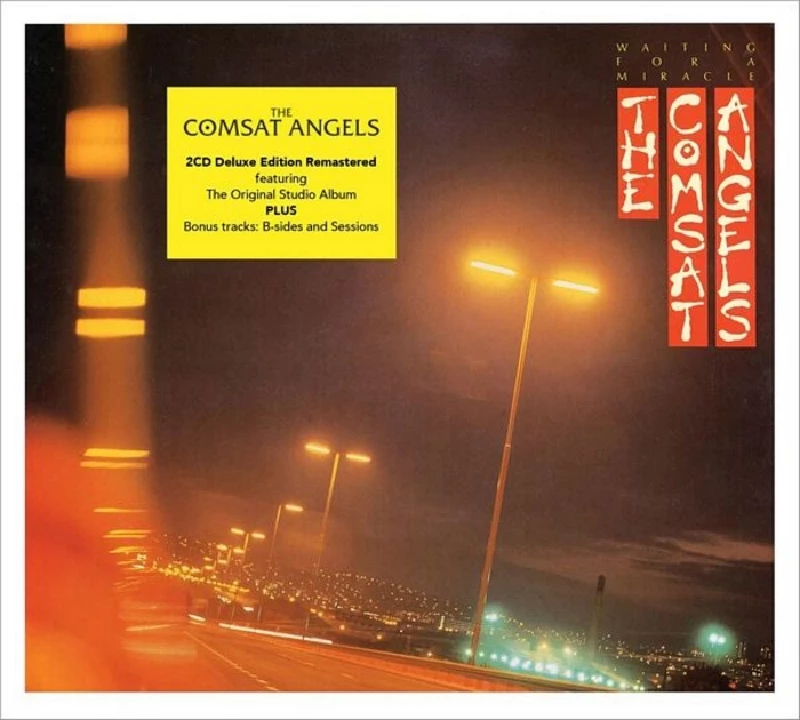
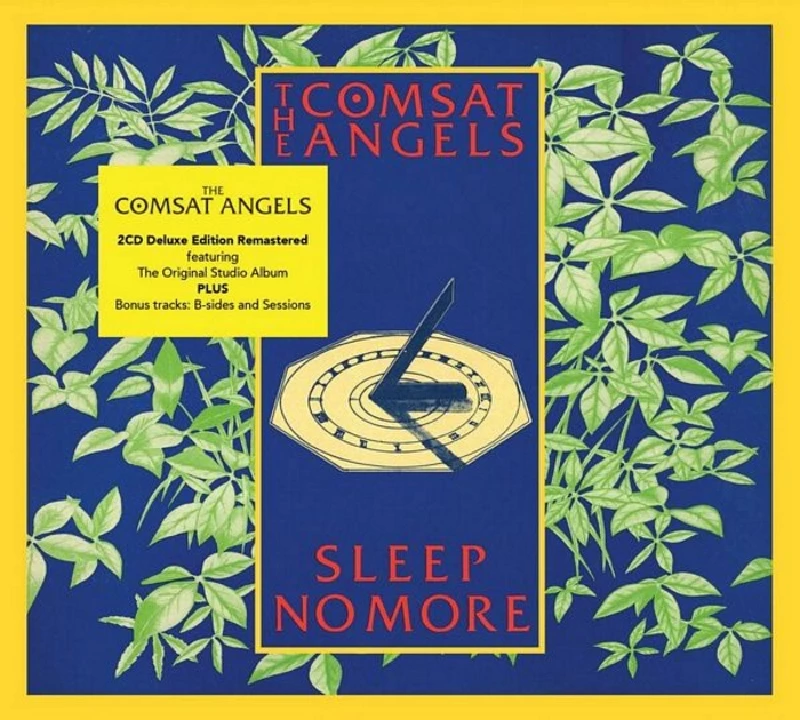
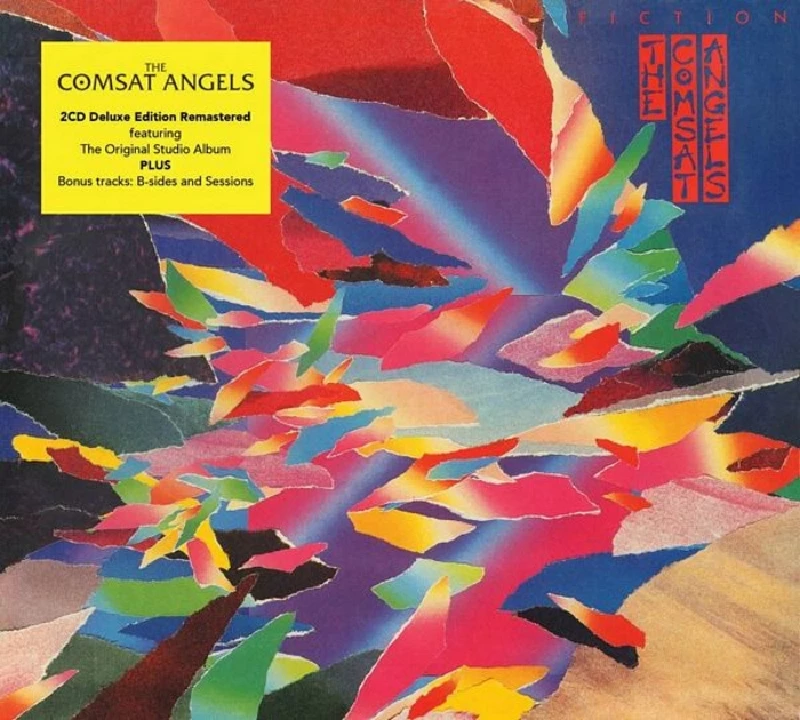
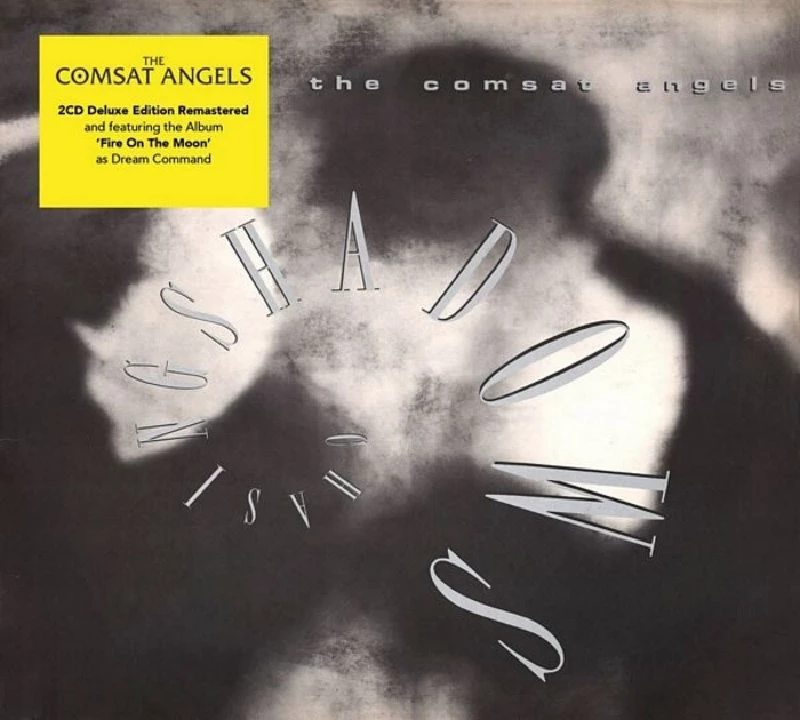
Visitor Comments:- |
| 827 Posted By: SimonH, Bristol on 22 Apr 2017 |
|
So refreshing to hear Stephen's perspective on things, even if he is far too hard on his own work. How often do you get this level of intelligence and honesty in an interview?
I interviewed Stephen in the early 90s and was very grateful for the gracious way he dealt with my fan boy questions!
Whatever he chooses to do or not do is fine with me (not that that matters) as I know it will be for the right reasons.
The comment re the piss in the fridge made me laugh out loud...in public:)
Thanks
|
interviews |
|
Interview with Stephen Fellows (2006) |
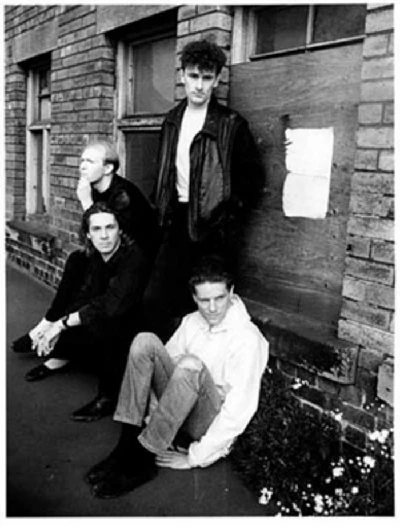
|
| One of the most underrated acts of the early 80's, the Comsat Angels twinned together sparse, economical musicianship and a large sound. While other bands of the era with a big sound such as U2, Simpl |
profiles |
|
Profile (2007) |
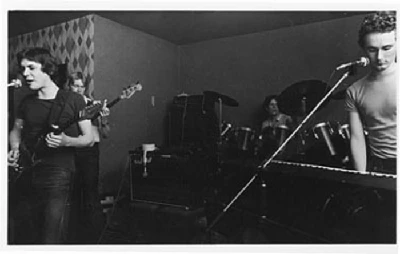
|
| Brooding post-punk 80's and early 90's Sheffield act the Comsat Angels are in the process of having their back catalogue reissued by the Renascent label. Denzil Watson profiles the three latest re-releases, demos and rarities album, 'To Before' and latter releases, 'My Mind's Eye and 'The Glamour' |
live reviews |
|
Islington Academy, London, 24/10/2009 |
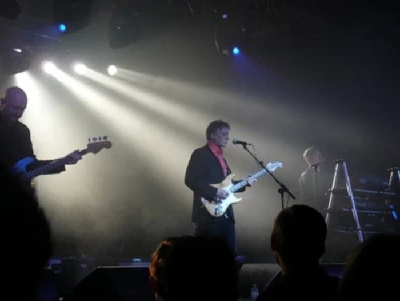
|
| On the last date of a short four day tour and their first London gig in nearly fifteen years, Anthony Strutt finds reformed Sheffield post-punks Comsat Angels to be both a powerful and still very contemporary live force |
most viewed articles
current edition
Spear Of Destiny - InterviewRobert Forster - Interview
Fiona Hutchings - Interview
When Rivers Meet - Waterfront, Norwich, 29/5/2025
Carl Ewens - David Bowie 1964 to 1982 On Track: Every Album, Every Song
Brian Wilson - Ten Songs That Made Me Love...
Pistol Daisys - Waterfront, Norwich, 29/5/2025
Nils Petter Molvaer - El Molino, Barcelona, 24/4/2025
Credits - ARC, Liverpool, 17/5.2025
Gary Numan - Berserker
previous editions
Heavenly - P.U.N.K. Girl EPDwina Gibb - Interview
Boomtown Rats - Ten Songs That Made Me Love....
Oasis - Oasis, Earl's Court, London, 1995
Sound - Interview with Bi Marshall Part 1
Trudie Myerscough-Harris - Interview
Serge Gainsbourg - Ten Songs That Made Me Love...
Brad Elvis - Interview
Susie Hug - Interview
Chuck Prophet - Ten Songs That Made Me Love...
most viewed reviews
current edition
Peter Doolan - I Am a Tree Rooted to the Spot and a Snake Moves Around Me,in a CircleGarbage - Let All That We Imagine Be The Light
Little Simz - Lotus
Suzanne Vega - Flying With Angels
John McKay - Sixes and #Sevens
Billy Nomates - Metalhorse
Vinny Peculiar - Things Too Long Left Unsaid
HAIM - I Quit
Eddie Chacon - Lay Low
Only Child - Holy Ghosts
Pennyblackmusic Regular Contributors
Adrian Janes
Amanda J. Window
Andrew Twambley
Anthony Dhanendran
Benjamin Howarth
Cila Warncke
Daniel Cressey
Darren Aston
Dastardly
Dave Goodwin
Denzil Watson
Dominic B. Simpson
Eoghan Lyng
Fiona Hutchings
Harry Sherriff
Helen Tipping
Jamie Rowland
John Clarkson
Julie Cruickshank
Kimberly Bright
Lisa Torem
Maarten Schiethart